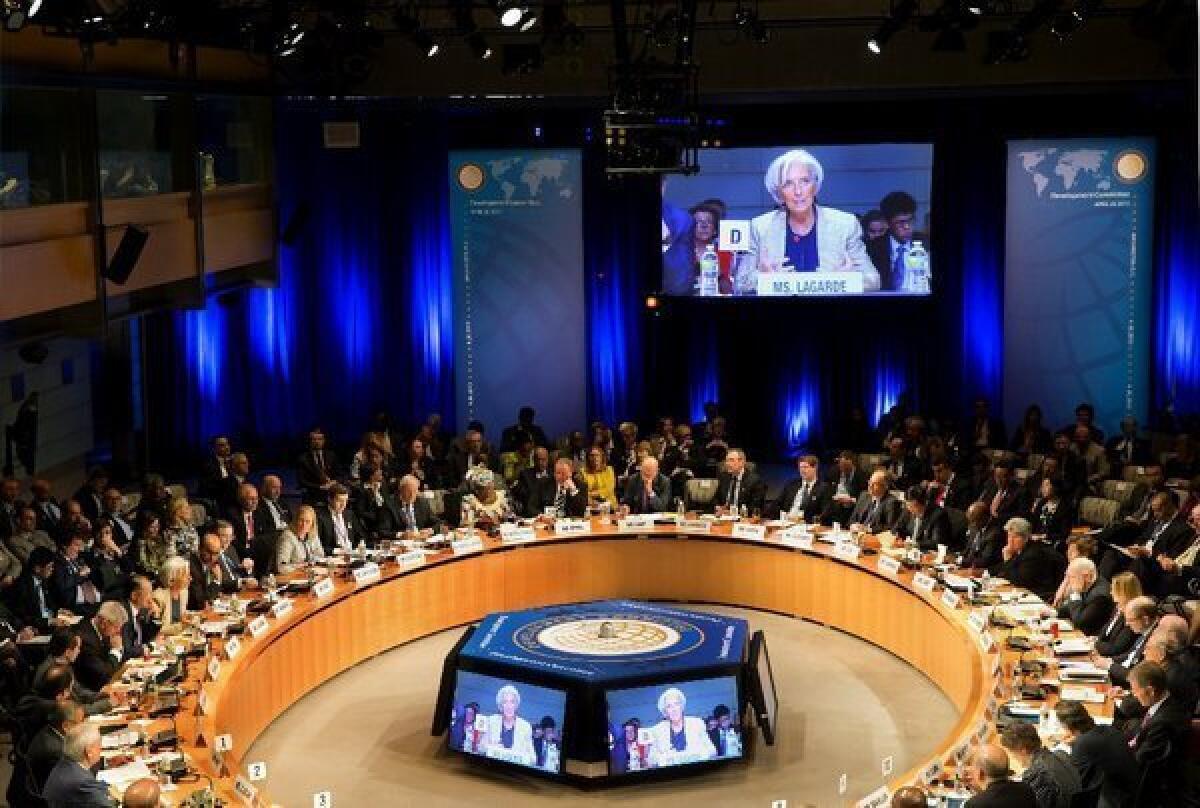IMF calls on U.S. to develop credible budget plan

- Share via
WASHINGTON -- Global finance leaders agreed that nations must take stronger action to spur still-lagging and uneven economic growth and job creation. And they had a pointed message for the U.S.: For the sake of the rest of the world, address your longer-range budget debt situation.
In a joint communique and in individual statements at the conclusion of the International Monetary Fund’s spring meetings Saturday, finance ministers and central bankers called on Washington to develop a credible plan to deal with its spending and debts over the next several years.
“Uncertainty regarding U.S. fiscal policy continues to weigh on growth prospects,” said Canada’s finance minister, Jim Flaherty.
“The U.S. fiscal cliff has been avoided,” noted Sultan Al-Suwaidi, governor of United Arab Emirates’ central bank, referring to the the broad tax increases and spending cuts that were mostly averted Jan. 1. But, he added, “delayed agreement on a comprehensive medium-term fiscal consolidation plan with back-loaded measures dampens growth in 2013.”
The IMF meetings and seminars here this week focused much more on the ongoing financial and economic problems in the Eurozone. And behind the prodding of the U.S., officials of the IMF and the Group of 20 major nations, which also met here this week as did the World Bank, backed off somewhat on their heavy emphasis on government austerity.
U.S. Treasury Secretary Jacob J. Lew on Saturday blamed Europe for slowing the global economy, saying in a statement: “Weak domestic demand has undercut euro area growth for six consecutive quarters and output continues to contract.”
He urged Europe to rebalance and work on “recalibrating the pace of fiscal consolidation,” contrasting that continent’s poor outlook with what he called a U.S. economy that “remains resilient and is gathering strength.”
The IMF is projecting that the U.S. economy will grow 1.9% this year. That is slightly less than its average annual growth over the last three years of recovery and puts the American economy in the middle of what the IMF has called the globe’s three-speed growth.
Emerging economies such as China are leading the way, and are expected to account for more than half of global growth this year. Meanwhile, Europe remains the laggard, reeling from high unemployment and recession in countries such as Italy and Spain. The IMF’s joint statement called on the euro area to make further progress in forming a banking union and making vital structural economic reforms.
Of the United States, the IMF statement said that “a moderate and steady private sector-led recovery is in the making.” But the fund said that both the U.S. and Japan, which is expected to show stronger growth thanks to monetary and fiscal stimulus, must address their public finances.
“Credible medium-term fiscal consolidation plans remain crucial, in particular for the United States and Japan,” the fund said.
Lew, in his statement, noted that the U.S. has “made considerable progress in reducing the size of the federal deficit” over the last three years. But even as Washington has made significant cuts in spending, most recently under the so-called sequestration, lawmakers have yet to agree on a budget plan that would deal with the longer-term challenge of America’s burgeoning healthcare costs, among other things.
Lew sought to reassure the IMF that the U.S. would do its part, saying: “The U.S. remains committed to bringing our deficits down to a sustainable level while building a foundation to promote economic growth.”
ALSO:
G-20 seeks to allay fear of currency war
Europe austerity strategy is hurting growth, IMF says
IMF lowers global growth forecast, warns of risks to economic recovery
More to Read
Inside the business of entertainment
The Wide Shot brings you news, analysis and insights on everything from streaming wars to production — and what it all means for the future.
You may occasionally receive promotional content from the Los Angeles Times.









